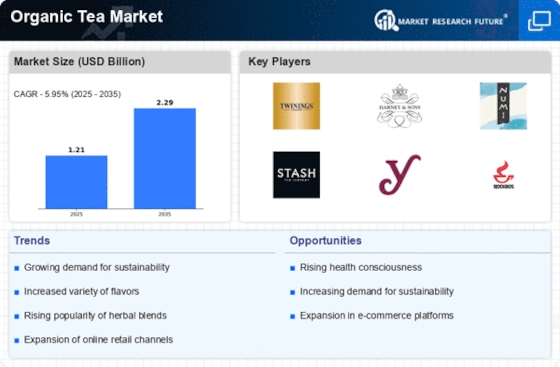Top Industry Leaders in the Organic Tea Market

Strategies Adopted by Organic Tea Key Players
The organic tea market has witnessed substantial growth driven by increasing consumer preferences for health-conscious and sustainably sourced products. The competitive landscape of this market is shaped by a mix of well-established players and emerging companies, each contributing to the expansion and diversification of the organic tea segment.
Key Players:
Tata Global Beverages Limited (India)
Unilever (UK)
Associated British Foods plc (UK)
Vahdam Teas (India)
Celestial Seasonings Inc (US)
Bombay Burmah Trading Corporation Ltd (India)
Stash Tea Company (US)
Bigelow Tea Company (US)
Shangri-la Tea (US)
Yogi Tea (US)
Republic of Tea (US)
Mighty Leaf Tea (US)
Numi Inc (US)
Harney & Sons Fine Teas (US)
Hälssen & Lyon GmbH (Germany)
The organic tea market deploy various strategies to navigate the competitive landscape. Product innovation is central to their approach, with companies introducing new and unique organic tea blends to cater to diverse consumer preferences. Strategic partnerships with organic tea growers and certifications ensure a transparent and reliable supply chain of high-quality tea leaves. Marketing efforts often focus on the health benefits, organic nature, and sustainability of the tea products, resonating with consumers seeking an authentic and eco-friendly tea experience.
Market Share Analysis:
The organic tea segment involves considering several key factors. Brand reputation and consumer trust play a pivotal role, with consumers often opting for organic tea from well-established and reputable companies. Distribution networks and partnerships with retailers significantly contribute to market share, ensuring that organic tea products are widely available and accessible to consumers. Pricing strategies, quality assurance, and adherence to certifications for organic and sustainable practices also play a crucial role in influencing market share dynamics in the competitive organic tea market.
News & Emerging Companies:
The organic tea market has seen the emergence of new players responding to the demand for unique and locally produced organic teas. Start-ups such as Artisan Leaf Tea Co. and Verdant Sips have entered the market, offering innovative and ethically sourced organic tea options with unique flavor profiles. These emerging companies contribute to the diversification of the organic tea segment, introducing novel products and catering to niche markets with specific preferences for artisanal and locally sourced organic teas.
Industry Trends:
The organic tea market reflect the evolving landscape of consumer preferences and the emphasis on health and sustainability. Key players are actively investing in research and development to create new organic tea formulations that align with evolving dietary trends, such as functional and flavored organic teas. Investments in sustainable and ethical sourcing practices are gaining prominence, aligning with the increasing consumer demand for responsibly produced organic tea products. Additionally, companies are exploring digital marketing strategies and e-commerce channels to enhance their market reach and adapt to changing consumer shopping behaviors in the organic tea segment.
Competitive Scenario:
The organic tea market is dynamic, with companies continually adapting to changing consumer preferences and market trends. The focus on health, sustainability, and organic options has intensified competition, prompting companies to highlight the quality and environmental friendliness of their organic tea products. The battle for shelf space in supermarkets and collaboration with local cafes and specialty stores further heightens the competitive landscape, leading companies to differentiate themselves through marketing, branding initiatives, and a commitment to providing organic tea options that meet the discerning tastes of consumers.
Recent Development
The organic tea market witnessed a significant development. Tata Consumer Products announced a strategic initiative to expand its organic tea sourcing network, partnering with small-scale organic tea farmers in emerging markets. This move aimed to support local communities and enhance the availability of high-quality organic tea products within Tata Consumer's portfolio. Unilever introduced a new range of sustainably packaged organic teas, leveraging eco-friendly materials to align with consumer demand for responsible packaging.
Organic India made headlines with the launch of a wellness-focused organic tea line, incorporating additional health-enhancing ingredients to cater to consumers seeking added functional benefits. The Republic of Tea invested in regenerative agriculture practices for its organic tea supply chain, aligning with the growing consumer demand for environmentally sustainable and ethical tea products. Numi Organic Tea expanded its presence in the premium organic tea segment through the acquisition of a specialty organic tea brand, aiming to strengthen its position in the evolving and competitive organic tea market. These developments underscore the competitive nature of the organic tea market, with companies actively innovating and adapting to meet evolving consumer expectations and secure their positions in this dynamic and health-focused industry.











